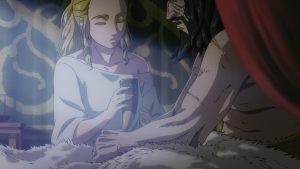 It doesn’t take a lot of perceptiveness to see that Vinland Saga is the best thing going in anime right now. Heck, it may be the best thing it’s had going for a long time (at this point I’d rank it ahead of any 2018 series – though it’s not the only 2019 show I’d say that about). But I sometimes have to stop and remind myself just how damn good it is, week after week. This is TV that’s cinematic in the very best sense of the word – in scope, in production quality, in storytelling. Epic and deeply personal at the same time is pretty much a sure-fire ticket to greatness, and that describes Vinland Saga in a nutshell.
It doesn’t take a lot of perceptiveness to see that Vinland Saga is the best thing going in anime right now. Heck, it may be the best thing it’s had going for a long time (at this point I’d rank it ahead of any 2018 series – though it’s not the only 2019 show I’d say that about). But I sometimes have to stop and remind myself just how damn good it is, week after week. This is TV that’s cinematic in the very best sense of the word – in scope, in production quality, in storytelling. Epic and deeply personal at the same time is pretty much a sure-fire ticket to greatness, and that describes Vinland Saga in a nutshell.
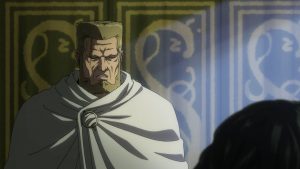 Speaking of which, epic and deeply personal are both traits I’d ascribe to Ohtsuka Akio. Among the small handful of great seiyuu I rank at the very top of the profession, Ohtsuka-san may be the one who most often makes me say “I can’t imagine anyone else possibly playing that part”. Seriously, Ohtsuka is Thorkell for me – all of his brutality and whimsy and well-hidden cleverness. Ohtsuka can blow the doors off while at the same time projecting very subtle nuances of the character he’s playing, something very few voice actors can do (and many would be lucky to be able to do just one or the other).
Speaking of which, epic and deeply personal are both traits I’d ascribe to Ohtsuka Akio. Among the small handful of great seiyuu I rank at the very top of the profession, Ohtsuka-san may be the one who most often makes me say “I can’t imagine anyone else possibly playing that part”. Seriously, Ohtsuka is Thorkell for me – all of his brutality and whimsy and well-hidden cleverness. Ohtsuka can blow the doors off while at the same time projecting very subtle nuances of the character he’s playing, something very few voice actors can do (and many would be lucky to be able to do just one or the other).
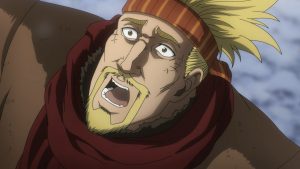 Thorkell and Askeladd are so opposite in so many respects, which is what makes them such fascinating bookends for this story. But they do have in common that they’re desperate not to lose any scrap they find themselves in, even if they have totally different methods of trying to prevent it. Because it’s the nature of Askeladd to be so meticulous, so careful, such a surgeon of strategy, when he makes a mistake it both stands out and represents a huge threat to his success. The survival of the ring girl from the village he massacred was a huge mistake any way you cut it, and fate has led the girl right into Thorkell’s arms.
Thorkell and Askeladd are so opposite in so many respects, which is what makes them such fascinating bookends for this story. But they do have in common that they’re desperate not to lose any scrap they find themselves in, even if they have totally different methods of trying to prevent it. Because it’s the nature of Askeladd to be so meticulous, so careful, such a surgeon of strategy, when he makes a mistake it both stands out and represents a huge threat to his success. The survival of the ring girl from the village he massacred was a huge mistake any way you cut it, and fate has led the girl right into Thorkell’s arms.
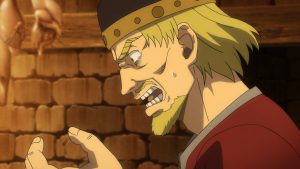 The matter of Karma is an interesting one where Vinland Saga is concerned, and I noted in my write-up last week my sense that Askeladd was not immune to it. Much is being made of Askeladd’s luck turning against him at last – heavy snow stalling his progress, Thorkell and the English discovering his location – but if one believes in luck, I think by definition they also believe in Karma. Askeladd is a real bastard – a magnificent one yes, but a bastard just the same. He’s a manipulator and a liar, someone whose only compass seems to be doing whatever he must to achieve his goals. He’s not exactly surrounded by saints, but even in this day and age Askeladd’s ruthlessness stands out because it’s so much colder and more detached than those around him (most dramatically Thorkell, perhaps).
The matter of Karma is an interesting one where Vinland Saga is concerned, and I noted in my write-up last week my sense that Askeladd was not immune to it. Much is being made of Askeladd’s luck turning against him at last – heavy snow stalling his progress, Thorkell and the English discovering his location – but if one believes in luck, I think by definition they also believe in Karma. Askeladd is a real bastard – a magnificent one yes, but a bastard just the same. He’s a manipulator and a liar, someone whose only compass seems to be doing whatever he must to achieve his goals. He’s not exactly surrounded by saints, but even in this day and age Askeladd’s ruthlessness stands out because it’s so much colder and more detached than those around him (most dramatically Thorkell, perhaps).
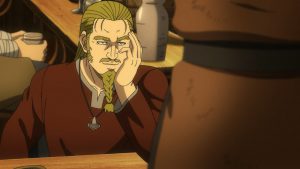 Theoretically the advantage Askeladd has is that he’s not burdened by a belief system the way Canute and his party are. But if Askeladd is doing all this in pursuit of a political end, that may be just as much of an anchor around his neck. When we see Canute’s priest question the love of his God, we see real anger in Canute for the first time. And it’s clear why that is – for him, the Father is a personal necessity. Because his own father doesn’t love him and he knows it, the love of his Father in Heaven is something Canute must believe in to keep himself moving forward. And meanwhile all this makes Thorfinn think of his own father, whose voice still echoes inside his head and fills him with misgivings about the life he’s chosen to lead.
Theoretically the advantage Askeladd has is that he’s not burdened by a belief system the way Canute and his party are. But if Askeladd is doing all this in pursuit of a political end, that may be just as much of an anchor around his neck. When we see Canute’s priest question the love of his God, we see real anger in Canute for the first time. And it’s clear why that is – for him, the Father is a personal necessity. Because his own father doesn’t love him and he knows it, the love of his Father in Heaven is something Canute must believe in to keep himself moving forward. And meanwhile all this makes Thorfinn think of his own father, whose voice still echoes inside his head and fills him with misgivings about the life he’s chosen to lead.
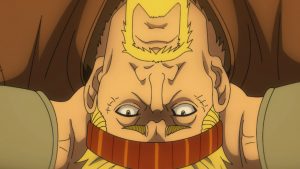 I can’t say I was surprised to hear that King Sweyn had sent Canute to the battlefield to die – frankly I’d pretty much assumed that from the beginning. Nor was I really surprised that Askeladd would have Ragnar assassinated – I suspected that might happen at some point, and as soon as his men arrived at the Prince’s hut I smelled a rat. Still, the way this was brought off was so brilliant that it was an utterly gut-wrenching sequence. Ragnar loved Canute to be sure, in a way the boy’s father never did. Ragnar died with honor even as he acted to help the man who’d killed him without it, knowing that man was Canute’s only chance of survival now.
I can’t say I was surprised to hear that King Sweyn had sent Canute to the battlefield to die – frankly I’d pretty much assumed that from the beginning. Nor was I really surprised that Askeladd would have Ragnar assassinated – I suspected that might happen at some point, and as soon as his men arrived at the Prince’s hut I smelled a rat. Still, the way this was brought off was so brilliant that it was an utterly gut-wrenching sequence. Ragnar loved Canute to be sure, in a way the boy’s father never did. Ragnar died with honor even as he acted to help the man who’d killed him without it, knowing that man was Canute’s only chance of survival now.
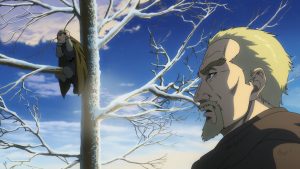 I wasn’t kidding when I referred to Canute as a “stepson” to Askeladd – I think he views both the prince and Thorfinn that way, even if his motivations are completely selfish. Askeladd is a user – using people is simply what he does. Thorfinn is useful to him, not so much as Canute is but ironically more than he was now that he can be Canute’s peer and friend. Canute’s symbolic value – to Askeladd, to Thorkell, to Sweyn – is obvious. Now that his emotional father has been ripped away from him, he must grow up quickly. And while that’s what Askeladd wants and why he did what he did, there are risks in this for him – for if Canute comes to understand his situation and decides to start thinking and acting in his own interests, he becomes extremely dangerous to Askeladd. And the same, ironically, can be said of Thorfinn…
I wasn’t kidding when I referred to Canute as a “stepson” to Askeladd – I think he views both the prince and Thorfinn that way, even if his motivations are completely selfish. Askeladd is a user – using people is simply what he does. Thorfinn is useful to him, not so much as Canute is but ironically more than he was now that he can be Canute’s peer and friend. Canute’s symbolic value – to Askeladd, to Thorkell, to Sweyn – is obvious. Now that his emotional father has been ripped away from him, he must grow up quickly. And while that’s what Askeladd wants and why he did what he did, there are risks in this for him – for if Canute comes to understand his situation and decides to start thinking and acting in his own interests, he becomes extremely dangerous to Askeladd. And the same, ironically, can be said of Thorfinn…


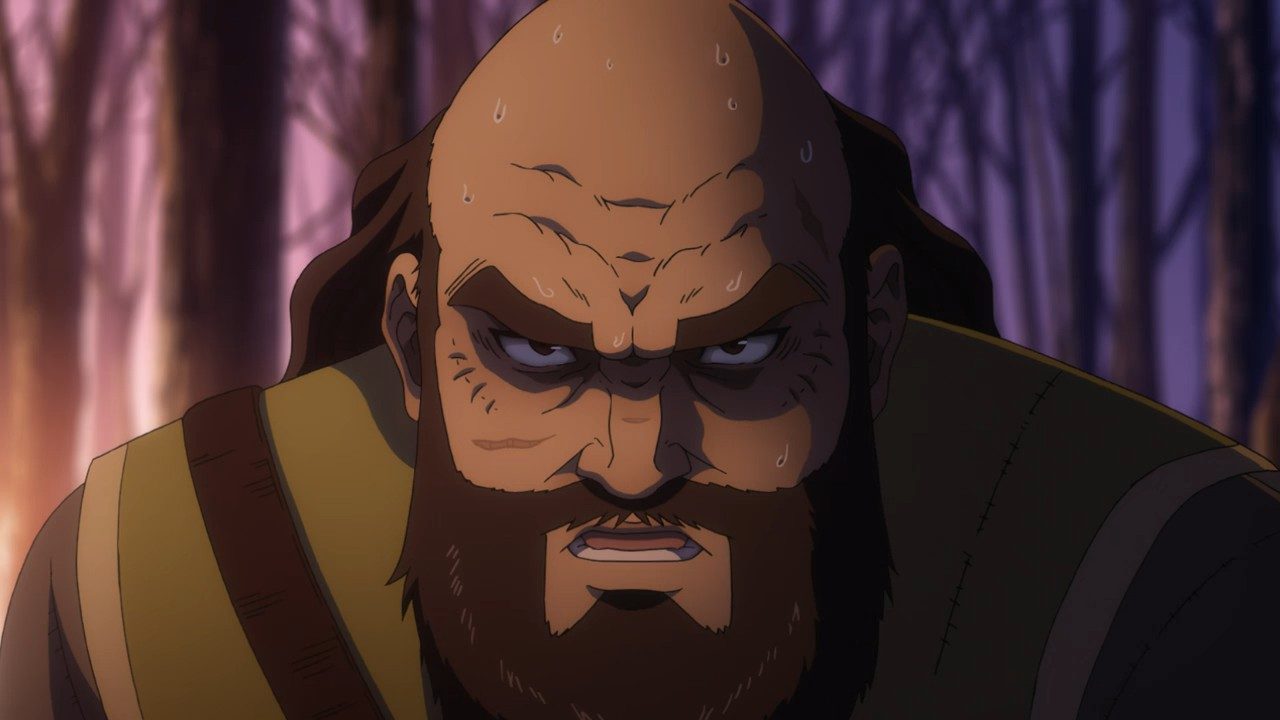
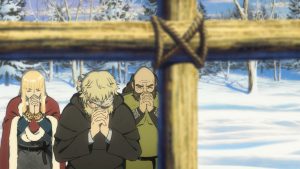
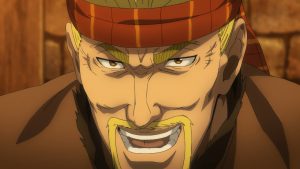

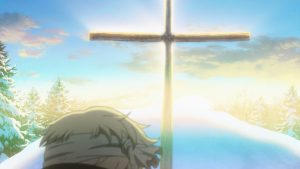
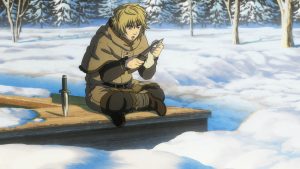
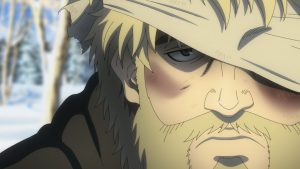


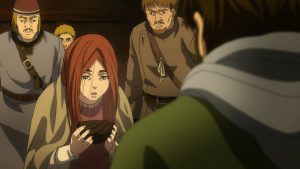
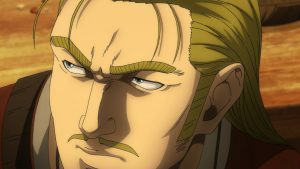
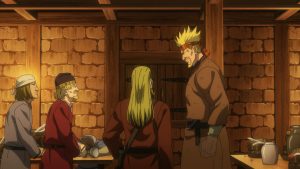
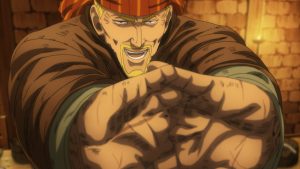
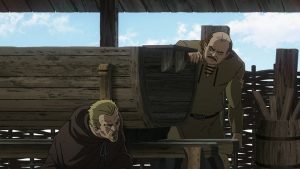
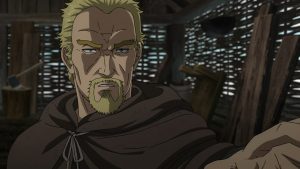
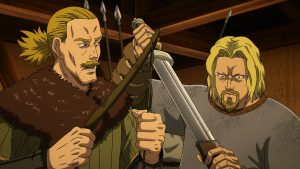

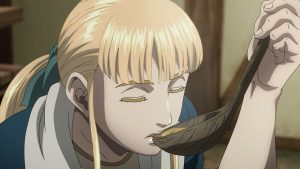
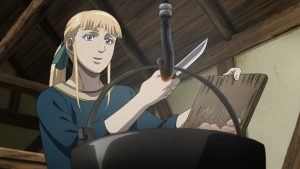
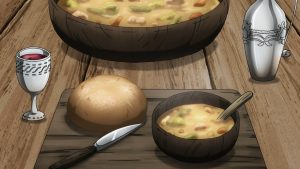
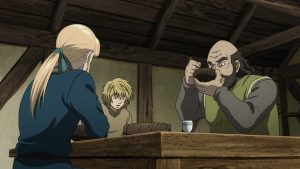
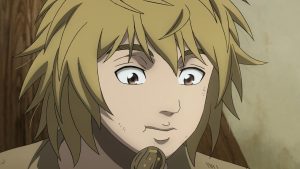

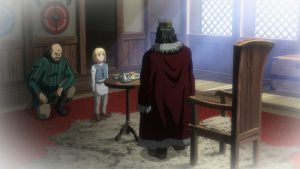
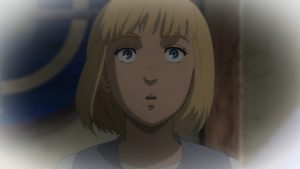
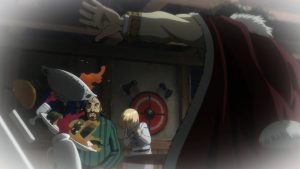
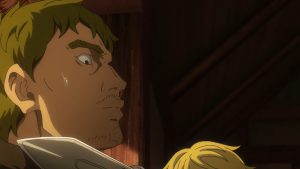
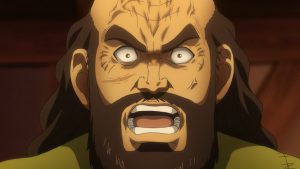
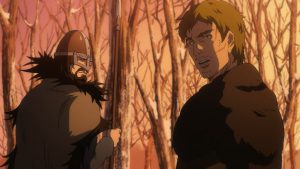
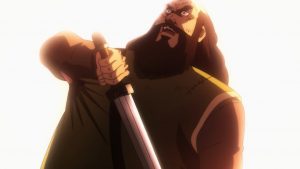
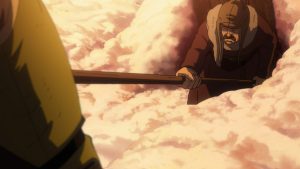
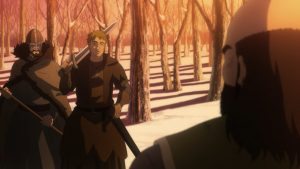
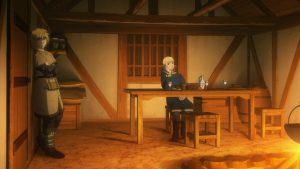
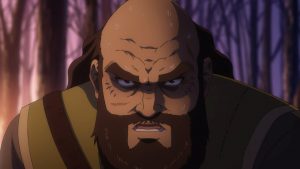
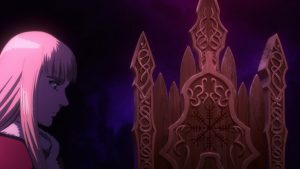

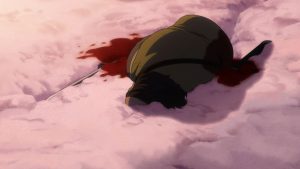
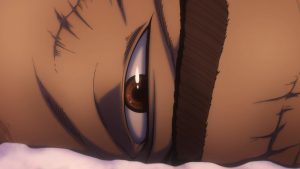

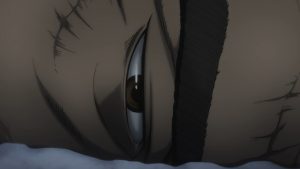
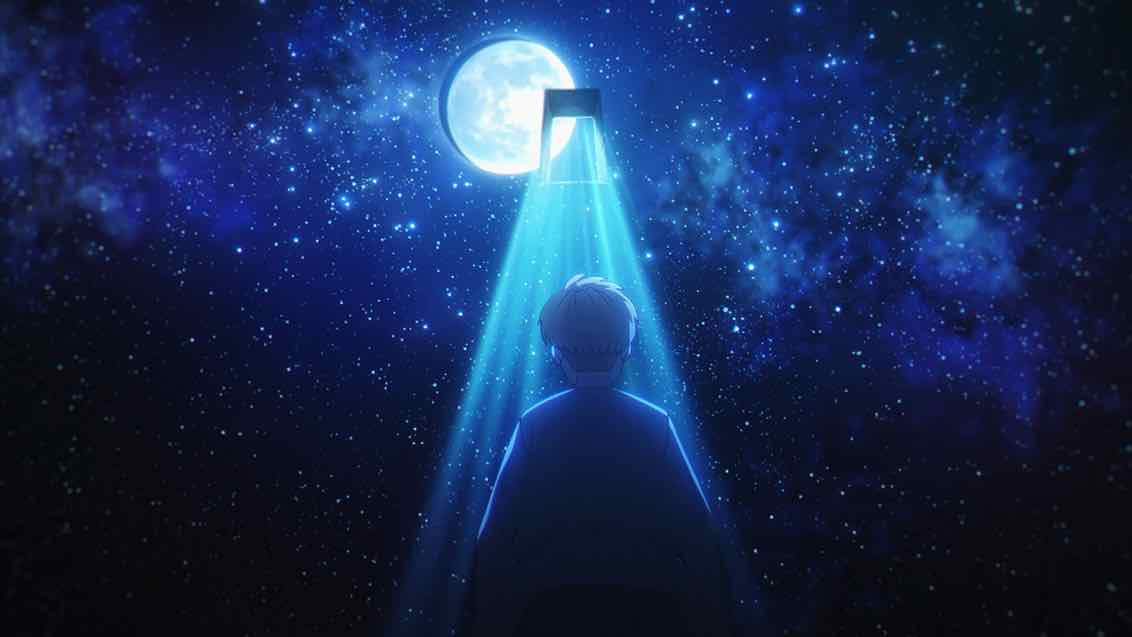

Miyu Fan
October 21, 2019 at 9:30 pmCinematic is the exact word that I’ll describe Vinland Saga. It’s so decidedly Western style that I don’t understand why there are no English dub in the works (we need that different languages spoken instead of all Japanese) and it’s really perfect for a Western live-action TV series. It kind of makes me sad that it’s not setting the Western anime community on fire.
Anyway it’s time for Karma to catch up with Askeladd anyway, everything can’t go all his way in the end with all the cruel decisions he did. I do wonder sometimes did Askeladd had really any political plans before this or would he have continue his Viking lifestyle if he didn’t stumble into Canute? I always felt if he didn’t met Canute he would just continue as a Viking until he met his end.
Derrick
October 22, 2019 at 7:24 amwell it’s hard to make any plans in that day without power, so I guess he just wants to collect as many strength as possible before checking if a path exists
Bah Hab
October 22, 2019 at 9:32 amEnjoyed your review. The opening paragraph is spot on.
Guardian Enzo
October 22, 2019 at 5:47 pmThanks!
Marty
October 22, 2019 at 9:10 pmI love how Thorfinn’s revenge has essentially taken a narrative backseat to the politics at play within King Sweyn’s court and Canute’s future.
It’s episodes like these that I love, they show the world is much bigger than just the MC and his quest, that actions have consequences, and all these different factions aren’t resting on their laurels, but they’re active and on the move. It’s almost like watching a chess game on a grand scale.
Color2413
October 24, 2019 at 5:14 pmI both enjoy and admire “Vinland Saga” but regarding “anime of the year,” based on the three episodes I’ve seen so far, “Mugen no Juunin – Immortal” is nipping at its heels — its ability to subtly create mood is remarkable. If Mugen can maintain the level of artistry over its full length, it will be a serious contender, and the choice may end up being a strong narrative and character-driven drama (Vinland) vs. an extended poem that combines an unusually literary script with music and visuals that seem to reach right into the viewer’s unconscious.
Guardian Enzo
October 24, 2019 at 5:59 pmThe budget scares me with Immortal, as great as the direction is. That and 20 years worth of manga cramming into two cours.